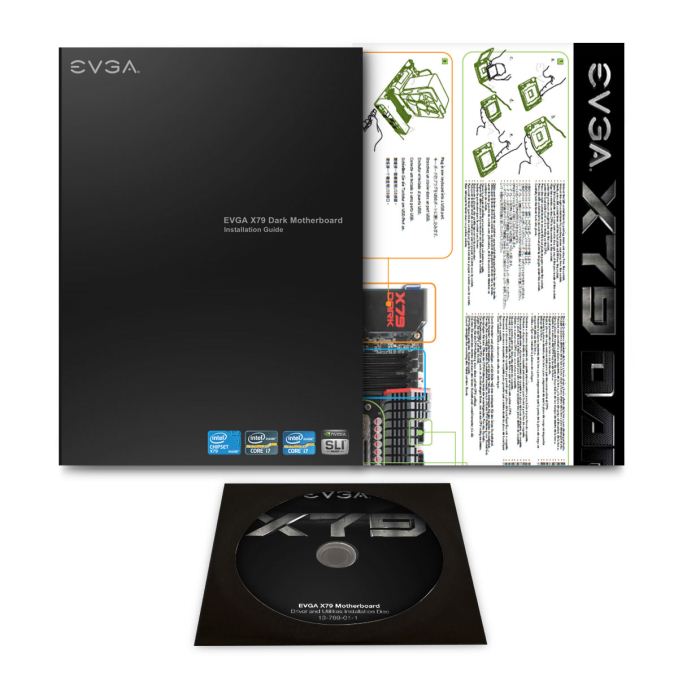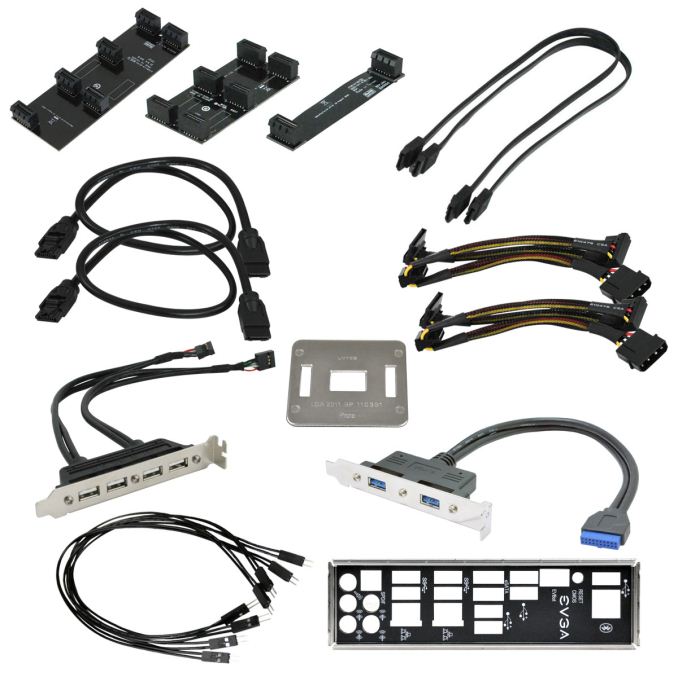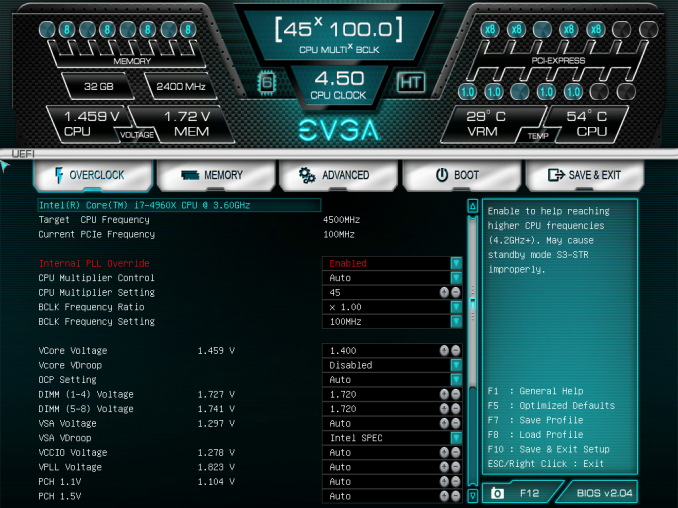EVGA X79 Dark Review
by Ian Cutress on October 23, 2013 10:00 AM EST- Posted in
- Motherboards
- Intel
- EVGA
- X79
EVGA X79 Dark In The Box
When counting out 400 simoleans for a motherboard, not only do we expect the motherboard to deliver, but the package should provide the goods as well. Normally in this price bracket we see specialist gaming/overclocking models that could come with specific components directed to that market segment. EVGA often take the tack of individually wrapped components with a lot of their motherboards having copious amounts of SLI bridges, molex-to-SATA or PCIe connectors as well as USB 2/3 rear brackets. This goes on top of the typical ‘EVGA deals with warranties, not the reseller’ sticker on each end of the box.
In the EVGA X79 Dark, we get the following:
Driver CD and pull out installation sheet
Rear IO Shield
Four SATA cables
One 2-way Long SLI bridge
One 3-way rigid SLI bridge
One 4-way rigid SLI bridge
Two molex-to-SATA (3) power cables
Smaller rear socket bracket
USB 3.0 rear panel connector
USB 2.0 dual rear panel connector
Front panel extension cables
As mentioned, all of these are individually wrapped in EVGA branded packaging, which immediately gets thrown in the bin after use. While I appreciate it might come as a marque of quality, most of these additional connectors are relatively cheap or un-necessary: is there really a need for molex to SATA connectors, often part of a PSU package, to be in the EVGA package? For a real marque, perhaps combine the USB 2 and USB 3 connectors into one front panel 5.25” box, along with a WiFi card?
EVGA X79 Dark Overclocking
Experience with EVGA X79 Dark
As mentioned in the previous page, by the time we got a BIOS that implemented turbo properly, overclocking seemed to fall on its head no matter what the settings, and thus for our overclock tests we rolled back to BIOS 2.04.
Despite the lack of auto overclocking features on the EVGA X79 Dark, it did overclock our CPU with relative ease in line with what we expected from our sample and what we experienced with other motherboards in this price range.
Methodology:
Our standard overclocking methodology is as follows. We select the automatic overclock options and test for stability with PovRay and OCCT to simulate high-end workloads. These stability tests aim to catch any immediate causes for memory or CPU errors.
For manual overclocks, based on the information gathered from previous testing, starts off at a nominal voltage and CPU multiplier, and the multiplier is increased until the stability tests are failed. The CPU voltage is increased gradually until the stability tests are passed, and the process repeated until the motherboard reduces the multiplier automatically (due to safety protocol) or the CPU temperature reaches a stupidly high level (100ºC+). Our test bed is not in a case, which should push overclocks higher with fresher (cooler) air.
Manual Overclock:
Using the Corsair H80i, we started at 4.0 GHz (40x100) for all cores at a CPU Vcore of 1.200 volts under ‘Intel Spec’ LLC. The following results were achieved.
Pushing the mid 90ºC for 4.6 GHz was a bit of a stretch in terms of regular stability, thus a nice medium of 4.5 GHz at 1.45 volts keeps the temperatures reasonable in conjunction with added stability.
This is the setting I have used for some overclock testing on the X79 Dark – 45x100 @ 1.450 volts, Intel Spec LLC. DRAM is at XMP but the voltage is increased to 1.72 volts, again just for a bit of headroom. This setup scores ~45000 CPU points on 3DMark Vantage.














23 Comments
View All Comments
JellyRoll - Thursday, October 24, 2013 - link
They lost Shamino :) They should have never let him go.Gen-An - Thursday, October 24, 2013 - link
Yep. Mr. Peter Tan was the reason why the X58 EVGA boards were so good, but once Asus got him, it was all over.DarkStryke - Friday, October 25, 2013 - link
They lost almost the entire motherboard engineering team to Sapphire like two years ago, and Shamino / Tan moved to ASUS. Their boards have been mediocre since, living off the hype fumes of the X58 glory days when they were one of the best boards out there.fluxtatic - Friday, October 25, 2013 - link
Interesting, as I was sort of under the impression that Sapphire had bailed back out of the motherboard market again a while back. I picked up a Sapphire Pure E-350 a couple years ago, as it was the right combination of price and features (even though documentation and support were fairly awful.) It's been a solid board, running my home file server. Last I looked, though, there were no Sapphire boards to be found. Maybe they just bailed on the US market?jasonelmore - Friday, October 25, 2013 - link
sapphire still makes AMD Graphics cards, and i'm sure they were recruited for them and not their motherboards lol.itchyartist - Wednesday, October 23, 2013 - link
good look for this motherboardpowruser - Thursday, October 24, 2013 - link
Crazy that they're asking $400 for this board. No ALC1150? ... Really? It's not like X79 is a brand new chipset, they've had plenty of time to figure out how to make a proper motherboard. Disappointing to say the least.defiler99 - Thursday, October 24, 2013 - link
I bought one of these and had nothing but trouble with it, despite using three different sets of RAM, etc, etc. I came to the conclusion that the board just wasn't ready to go, and got an ASUS X79-DELUXE instead. So far, working 1000% better.P4spooky - Friday, October 25, 2013 - link
Not to mention $50 cheaper! Shame the hardware looks impressive but don't have time to mess around with buggy bios issues.jasonelmore - Friday, October 25, 2013 - link
i dropped EVGA a couple of years ago and went to Asus simply because of their Custom PCB Video cards, and awesome motherboards.. EVGA was great, but they lacked a lot of custom and high performance components. All of their graphics cards were basicly a refrence design with a evga sticker.Here recently, they've heard the outcry and started making custom coolers, and maybe 1 or 2 custom pcb cards, but their engineering department pales in comparison to Asus's.
EVGA does win in the warranty and customer service departments. I loved that about evga, however i would have to rma my cards about once a year due to failing components. Now since i've went to custom pcb cards with better cooling and better parts, i haven't had to RMA once.. And if i ever have to RMA with Asus, i dread it, because they're customer support is awful.